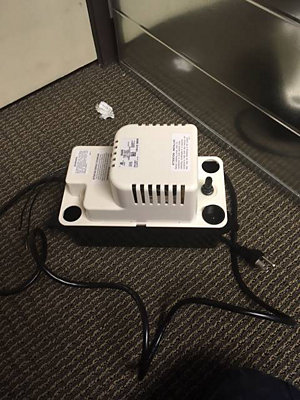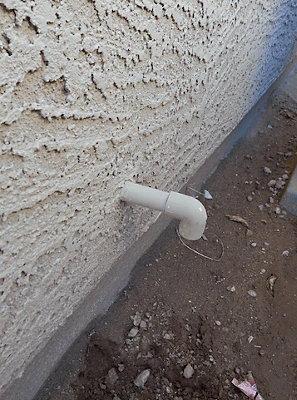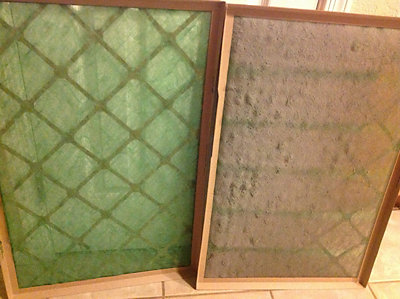Why Your Air Conditioner is Leaking Water Inside Your Home
First, do this now: Turn off your AC. This will help minimize any damage to electrical parts and will protect your home from further water damage.
Now that your AC is no longer running, let’s start troubleshooting your unit’s problem. If your AC is leaking water in your home, you likely have one of two situations:
- Problems with your AC condensate drain system
- Frozen refrigerant lines that have thawed out
Don’t worry. We’ll show you how to determine the problem you have and what you need to do next.
But first, let’s take a quick look at why it’s normal for an air conditioner to produce some condensation…
Why your AC produces condensation
Your air conditioner doesn’t just cool your air, it also dehumidifies it. As warm air from your home passes over your evaporator coils, the refrigerant inside the coils absorbs both heat and moisture from that air.
Over time, moisture from the air collects on those coils. And once the cooling cycle is over, the moisture drips off from the coils and into a condensate pan. As the water level in the pan rises, water is pushed into a PVC condensate drain line that directs the water outside.
Now that we know how air conditioners produce condensation, let’s look at some of the problems with that process that can lead to leakage.
Your AC condensate draining system is responsible for collecting and getting rid of the moisture produced by your AC.
But problems with this system can lead to water leakage, including:
- A faulty float switch
- A clogged condensate drain line
- A damaged drain pan/tray
- A broken condensate pump
Let’s take a closer look at each of these problems.
A faulty float switch
What an AC condensate float looks like
Some AC systems have a float switch that “monitors” the water level inside your AC’s condensate tray. When the water level gets too high, a small valve in the switch “floats” up and signals for the AC to turn off, preventing any water from overflowing.
But if that float switch has gone bad, it will no longer shut your AC off in the event of an overflowing condensate tray.
So, if your condensate tray is overflowing and there’s a small device attached to the rim of the tray, you likely have a bad float switch that needs to be replaced.
Some of the problems that can cause the condensate tray to overflow and leak water include:
A clogged condensate drain line
Outdoor condensate main line.
As water drips off of your AC coils and travels down the drain line, it brings with its bacteria that can attach itself to the inside of the PVC condensate drain line. And over time, that bacteria can grow, causing a slimy, icky blockage.
And if water can’t pass through the condensate drain line, it will build up in the pan and eventually overflow causing leakage and water damage.
Steps to clear your condensate drain line with a wet/dry vac
- Find where your condensate drain line exits outside your home.
- Attach the end of your wet/dry vac to the end of the drain. You can either use duct tape to secure the connection or invest in some fittings to create a more effective airtight connection.
- Turn on the wet/dry vac and wait for the gunk to fill the wet/dry vac. Repeat as many times as needed until water from your AC can flow freely through the drain.
A damaged condensate tray
Your condensate tray sits under your evaporator coils and collects the moisture that drips off your AC coils. But if that tray is old and rusted or is cracked, it will leak water instead of containing it safely.
A broken condensate pump
Some AC’s need special pumps that push the water up and out of the house. So, if your AC is located in the basement, you probably have a condensate pump that pumps moisture upwards into the drain line where it’s then directed outside.
If the condensate pump dies, though, that water can’t be pumped outside. Instead, it sits and collects in the condensate tray until it eventually overflows and causes leakage.
Situation #2: Frozen refrigerant lines that have thawed out
Certain problems with your air conditioner can cause refrigerant lines to freeze up. And if your AC isn’t running for longer than 3-4 hours (i.e., on a cool night), it gives those frozen coils enough time to thaw out and leak water in your home.
So what’s causing your AC coils to freeze up in the first place? Well, 3 main problems cause this:
- Dirty air filter
- Dirty evaporator coils
- A refrigerant leak
We’ll explain each one in detail below and show you what you can do to fix it.
Related: Why Is Ice Forming On My AC Unit's Pipes?
Dirty air filters
If your air filter is clogged, it restricts the amount of air that your AC can pull into the system. And when there’s not enough warm indoor air being pulled over your refrigerant coils, those coils quickly drop in temperature.
And remember how your AC coils also absorb moisture from the air? Well, as moisture collects on those cold refrigerant coils it quickly turns to ice, eventually leading to a completely frozen over coil.
What to do:
Change your air filter immediately if it looks like the filter to the right in the picture below.
You should change your filter if it looks dirty like the one on the right.
Dirty evaporator coils
Your evaporator coils are responsible for cooling and dehumidifying the air inside your home.
But over time they can become dirty as dust and dirt rest on the coils. If that layer of dirt/dust is thick enough, it prevents the coils from absorbing the heat from the air inside your home. And when the coils can’t absorb any heat, they quickly drop in temperature, causing any moisture from the air to freeze as it comes in contact with the coils. Eventually, you have completely frozen evaporator coils (pictured at the top of this page).
What to do:
Have a professional clean your coils immediately. Make sure you don’t run your AC until the coils are cleaned thoroughly.
A refrigerant leak
Your AC system uses refrigerant to cool the air inside your home and it requires a specific amount of refrigerant to work effectively.
But over time, wear and tear on your refrigerant coils can cause small cracks, allowing some refrigerant to leak out of the system. And when there’s not enough refrigerant in the system, the temperature of the refrigerant coils drops and eventually ice over.
What to do:
Have a professional find and repair the leak. Then they can add more refrigerant to your system so that it can cool properly again.
Have a Denver tech repair your leaking AC
Still need help with an AC that’s leaking water in your home? We can help.
Just contact us and we’ll send over a professional right away to repair your AC and prevent further water damage.
Related reading:
Need help from a Colorado Plumbing, Heating, Cooling, or Electrical Specialist?
For your convenience, you can request an appointment in one of two ways:
- Call us at (303) 436-2525 for immediate assistance.
- Click on the button below to schedule your appointment online.
Related Reading
Join Our Email Newsletter
Receive updates, current news, promotions, and industry tips.



